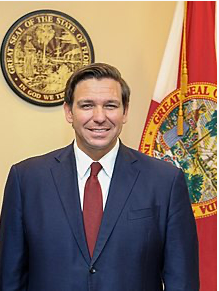By John Haughey
The Center Square
October 6, 2020

Florida Gov. Ron DeSantis ranks ninth among 47 governors in tax-and-spend policies, according to an analysis released Monday by the Cato Institute.
Described as “a lean budgeter” in Cato’s 15th biennial fiscal report card, the Washington-based Libertarian think tank gave DeSantis a B grade overall for scrutinizing spending during the COVID-19 pandemic and its subsequent recession.
“General fund spending rose just 3 percent in 2020, and in response to the recession this year, DeSantis vetoed $1 billion in spending from the legislature’s original 2021 budget,” Cato said of DeSantis.
The day before the $93.2 billion fiscal year 2021 budget lawmakers approved in March went into effect July 1, DeSantis issued an 18-page list of 620 cuts that slashed $1 billion from the plan.
The pandemic-altered budget still included $47.4 million in tax cuts – down from $230 million approved during the legislative session – and $543 million in corporate income taxes overcollected in the wake of the 2017 federal Tax Cuts & Jobs Act (TCJA), which reduced the federal corporate income tax from 35% to 21%.
Also still funded in the fiscal 2021 budget was $500 million for a statewide teachers’ salary increase, a 3% salary hike for 90,000 state workers, $9.2 billion for infrastructure projects, a $137 boost in per-capita student spending, $100 million for the Forever Florida land acquisition program and nearly $700 million for water quality projects.
Cato’s report also cited DeSantis’ efforts in reducing the state’s corporate tax from 5.5% to 4.5% and lowering its commercial lease sales tax from 5.7% to 5.5% in 2019 and from 5.5% to 5.4% this year. Florida is the only state with such a tax levy.
“DeSantis scored above average on taxes because of his support of numerous modest tax cuts,” the report states, but he probably could have joined four fellow GOP governors with an A grade if he scored higher in revenue generation.
Cato’s report notes states are seeing revenue plugs from online taxes and sports betting in the wake of 2018 U.S. Supreme Court rulings in South Dakota v. Wayfair, which allows states to compel out-of-state remote sellers remit sales taxes, and Murphy v. NCAA, which overturned a federal law that banned sports betting in most states.
Florida is among seven states without an online tax collection law. It’s also among 20 states that haven’t enacted laws taxing sports betting.
Sen. Joe Gruters, R-Sarasota, the Republican Party of Florida chairperson, sponsored a 2020 bill that required online sellers collect and remit Florida’s 6 percent sales tax, but it failed.
Florida TaxWatch (FTW) said lawmakers should join “the rest of the nation in taking measures to collect the taxes already owed on internet sales (e-fairness),” which “could bring in $700 million annually” for the state.
FTW also said DeSantis and lawmakers must hasten negotiations with the Seminole Tribe to secure a renew gaming compact that could generate another $700 million annually for the state.
The Seminoles stopped making $350 million in annual payments when their pact with the state expired in May 2019 after failing to reach an accord with lawmakers over banked card games, online gaming and sports gambling.
State negotiators reportedly were near securing a renewed compact in March that could garner up to $700 million annually by allowing the Tribe to add craps and roulette to slot machines and banked card games, such as blackjack.
Only Republican governors made the top 10 in Cato’s report card. Four earned A grades: New Hampshire’s Chris Sununu, Iowa’s Kim Reynolds, Nebraska’s Pete Ricketts and Wyoming’s Mark Gordon. Seven governors, all Democrats, flunked with F grades.

Well he has had to deal with the China Virus which under any circumstance has taken his time and the State is better off with him in the Governor’s chair.